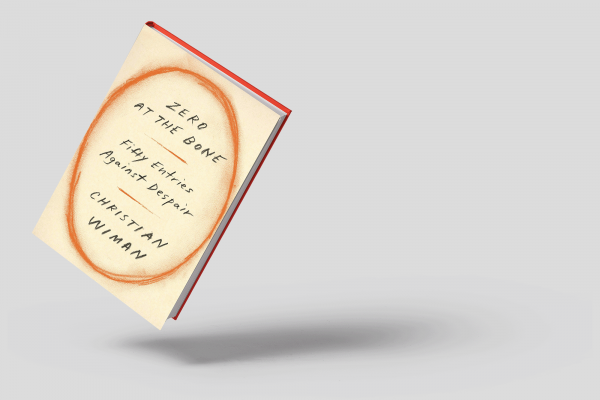IN HIS LATEST book, Zero at the Bone: Fifty Entries Against Despair, Christian Wiman is not concerned with suspense. Two paragraphs into his first “entry against despair,” he discloses the fiercest nemesis of that tried-and-true doom and gloom. “The only true antidote to the plague of modern despair is an absolute — and perhaps even annihilating — awe,” he writes.
That’s probably why Wiman, writer, translator, and professor of communication arts at Yale Divinity School, begins Zero at the Bone by mining the wisdom of the world’s biggest experts on awe: children. His latest collection leans on the “visionary innocence” of a child “whose unwilled wonder erases any distinction between her days and her dreams.” Wiman has had daily access to two such visionaries: his twin daughters Eliza and Fiona.
Unfortunately, he has also had steady access to despair, most visibly through his 19-year battle with a rare, aggressive form of bone cancer. He is currently in remission.
“I had — have — cancer. I have been living with it — dying with it — for so long now that it bores me, or baffles me, or drives me into the furthest crannies of literature and theology in search of something that will both speak and spare my own pain,” he writes.
Zero at the Bone honors its subtitle, spending most of its pages combatting despair: Wiman prays for both the miracle and the trivial, theologizes at a Planet Fitness, and exegetes Lucille Clifton’s poetry with biblical reverence. Technically, the book is a collection of essays, poetry (his and others’), literary criticism, and theology. Operationally, it’s a first aid kit for the sometimes despairing, sometimes despondent masses.
And yet “a writer is not obligated to fight despair. Sometimes,” Wiman writes, “the best gift can be the starkest depiction of an intractable reality, that head-clearing unsquinting astringent allover intake of a truth.” The lament is just as valuable as the sermon.
So, while Wiman no doubt positions Zero at the Bone toward hope, he doesn’t downplay or dulcify despair, and never drinks from “the lemonade that people squeeze out of their tumors.”
Of the hidden despair of miscarriage, he writes, “There is an entire life that didn’t happen, which happens in me forever now.”
Of slave ships named after Jesus, Wiman writes, “How does one take seriously the love of God when it has been so thoroughly — and so often — transformed into an engine of death?” He asserts that, if present on the ship, God was “shackled and sweating and merged with human terror.” (But still I wonder: Why didn’t God commandeer the ship and stop this horrific suffering?)
Wiman prints Wallace Stevens’ poem “Domination of Black” in full. “This may be my favorite poem,” he writes, then adds: “I don’t know what this poem means.”
This admission gave me pause and a chuckle. How can your favorite poem be one you don’t understand? Then I remembered that “awe,” that faithful antidote, must be composed of at least 50 percent unknowing, and that I too love things I don’t really understand: centripetal force, the color blue, the end of Interstellar, and obviously, God.
God is mainly mystery, but, as Wiman assured us in a recent NPR interview, “that doesn’t mean mystery can’t love you.”

Got something to say about what you're reading? We value your feedback!






